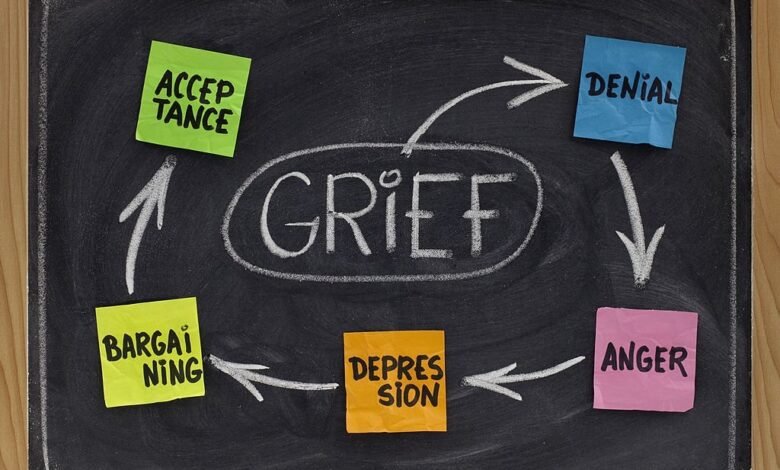What are the Five Stages of the Divorce Grief Cycle?

Grief cycle in divorce refers to the phases that people often encounter during the dissolution of their marriage. Elisabeth Kubler-Ross, a Swiss-American psychotherapist, developed these phases of mourning. Although each individual’s experience is unique, the phases of sorrow associated with divorce are quite similar to those associated with the loss of a loved one or other terrible life events. Trusted Mediators Hertfordshire explain more:
The phases consist of:
1. Shock and Denial:
You may feel numb and have difficulty processing the truth of the event at this period. You may find it difficult to accept that your marriage is ending. Some individuals will deny that the discussion ever occurred or attempt to forget it. You may feel as if you’ve been struck by a bus, and your brain may attempt to eliminate the circumstance by denying it is occurring.
Take a break to reflect on the current situation. Try to clear your thoughts and concentrate on the positive steps you may take to overcome this situation.
2. Pain and Guilt:
As the first shock subsides, you may experience emotional suffering and despair. You may also suffer remorse and possibly a sense of responsibility for the dissolution of your marriage. You may also worry about the impact it may have on your children, your friends, and your extended family.
Know that emotional suffering is typical at this time, but it will pass. Remind yourself that it is not the divorce itself that might do damage to your children or extended family, but the manner in which you handle it. A solid parenting strategy may assist with this.
3. Anger and Bargaining:
As the pain and grief subside, you may experience anger and resentment. You may also attempt to negotiate or bargain with your spouse to salvage your marriage. At this point, marital counselling is often suggested, but it may be difficult, though not impossible, to effectively salvage the relationship.
Additionally, anger is a prevalent emotion at this period. Anger against your former, anger towards yourself, and anger towards family members who you believe may have contributed to the breakup.
If it is evident that the marriage is irretrievably broken – and both parties must agree to this – you should consider what you can manage. You have control over your response to this circumstance, the professional assistance you seek to support you through this time in your life, and how you see your new future.
Also Read: Can Children Choose Which Parent They Want To Live With?
4. Depression:
During this period, you may experience an abundance of grief and loss. You may sense powerlessness and despair. The light at the end of the tunnel is difficult to see. And many individuals resort to drink, drugs, or other substances in an effort to feel better. This is a perilous time that requires counsel and assistance.
Top recommendation: Create a strategy. Being sad is not a desirable state of being. But having a strategy for the future might help you move forward significantly. Allow yourself two years (the average amount of time it takes for a person to properly heal from a divorce) and put down your life objectives. Possibly something you’ve been delaying or something you’ve always wanted to do, but your ex would not have supported. After allowing yourself some time to get over this phase of your life, you should begin working toward accomplishing your life objectives. Consider seeking the assistance of a counsellor, therapist, or divorce coach.
5. Acceptance:
You may eventually reach a point of acceptance, when you may admit the situation’s truth and begin to move ahead. You may begin to prioritise personal development and life reconstruction. At this point, individuals might realise that the experiences they have experienced have improved their lives.
Top tip: Maintaining a degree of animosity against your ex-partner will ultimately harm you more than them. Focus on what you can accomplish and what you can manage yourself. You will be completely fine if you concentrate your efforts on a prosperous future.
Not everyone will experience every step or follow this cycle in a straight path. Some people may cycle through phases frequently or experience some stages with more intensity than others.
Determine where you both stand in this cycle. It is a totally different discussion if one of you is in the first stages of shock and denial while the other has reached the final stages of acceptance after a longer period of reflection.
By determining where you and your ex are in the cycle, you may choose how to best handle talks, whether to seek professional assistance such as counsellors, divorce coaches, and family mediators, and when to give each other some distance.
Conclusion
Grief after divorce may be a lengthy and difficult process, but people can heal and move on with time, support, and self-care. Having operated a family mediation firm since 2011 and gone through a divorce myself, I can promise you that everything will be well. Your life will become as extraordinary as you can make it. It depends on how long it takes to reach the location. You are solely responsible for this circumstance.
We provide a free 15-minute session to discuss the mediation process and how it might fit into your current stage of the mourning cycle.






